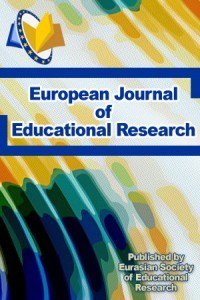An Investigation of Prospective Mathematics Teachers’ Knowledge of Basic Algorithms with Whole Numbers: A Case of Turkey
An Investigation of Prospective Mathematics Teachers’ Knowledge of Basic Algorithms with Whole Numbers: A Case of Turkey
___
- Ball, D. L. (1990). Prospective elementary and secondary teachers’ understanding of division. Journal of Research in Mathematics Education, 21, 132-144.
- Ball, D. L., Thames, M. H., & Phelps, G. (2008). Content knowledge for teaching: What makes it special? Journal of Teacher Education, 59(5), 389- 407.
- Creswell, J. W. (2007). Qualitative inquiry and research design: Choosing among five approaches (2nd ed.). Thousand Oaks, California: Sage Publications, Inc.
- Engelbrecht, J., Harding, A., & Potgieter, M. (2005). Undergraduate students’ performance and confidence in procedural and conceptual mathematics. International Journal of Mathematical Education in Science and Technology, 36(7), 701-712.
- Even, R. (1993). Subject matter knowledge and pedagogical content knowledge: Prospective secondary teachers and the function concept. Journal for Research in Mathematics Education, 24(2), 94-116.
- Grossman, P. L. (1990). The making of a teacher: Teacher knowledge and teacher education. Teachers College Press, Teachers College, Columbia University.
- Hiebert, J., & Lefevre P. (1986). Conceptual and procedural knowledge in mathematics: An introductory analysis. In J. Hiebert (Ed.), Conceptual and procedural knowledge: the case of mathematics, (pp.1- 27). Hillsdale, NJ: Lawrence Erlbaum Associates.
- Isiksal, M. (2006). A study on pre-service elementary mathematics teachers‟ subject matter knowledge and pedagogical content knowledge regarding the multiplication and division of fractions. Unpublished doctoral dissertation, Middle East Technical University, Turkey.
- Lucus, C. A. (2006). Is subject matter knowledge affected by experience? The case of composition of functions. In J. Novotna, H. Moraova, M. Kraka & N. Stehlikova (Eds.) Proceedings of the 30th Conference of the International Group for the Psychology of Mathematics Education (Vol. 2, pp. 97-104). Prague: PME
- Ma, L. (1999). Knowing and teaching elementary mathematics: Teachers’ understanding of fundamental mathematics in China and the United States. Mahwah, NJ: Lawrence Erlbaum Associates.
- Merriam, S. B. (2009). Qualitative research: A guide to design and implementation. San Francisco: Jossey-Bass.
- National Research Council. (2001). Adding it up: Helping children learn mathematics. Washington, DC: National Academy Press.
- Nilsson, P., & Lindstrom, T. (2012, July). Connecting Swedish compulsory school teachers' content knowledge of probability to their level of education, teaching years and self-assessments of probability concepts. Paper presented at the 12th International Congress on Mathematical Education, Seoul, Korea.
- Philipp, R., Schappelle, B., Siegfried, J., Jacobs, V., & Lamb, L. (2008). The effects of professional development on the mathematical content knowledge of K-3 teachers. In annual meeting of the American Educational Research Association, New York.
- Rittle-Johnson, B., Siegler, R. S., & Alibali, M. W. (2001). Developing conceptual understanding and procedural skill in mathematics: An iterative process. Journal of Educational Psychology, 93(2), 346.
- Rowland, T., Huckstep, P., & Thwaites, A. (2005). Elementary teachers’ mathematics subject knowledge: The Knowledge Quartet and the case of Naomi. Journal of Mathematics Teacher Education, 8(3), 255-281.
- Siegfried, J. M., Gordon, J. M., & Garcia, J. R. (2007). Barely in STEP: How professional development affects teachers’ perspectives on and analysis of student work. In T. Lambert & L. R. Wiest (Eds.), Proceedings of the 29th annual meeting of the North American Chapter of the International Group for the Psychology of Mathematics Education. University of Nevada: Reno.
- Shulman, L. S. (1986). Those who understand: Knowledge growth in teaching. Educational Researcher, 15(2), 4-14.
- Shulman, L. S. (1987). Knowledge and teaching: Foundations of the new reform. Harward Educational Review, 57(1), 1-22.
- Strauss, A., & Corbin, J. M. (1990). Basics of qualitative research: Grounded theory procedures and techniques. Newbury Park, California: Sage Publications, Inc.
- Thanheiser, E. (2009). Preservice elementary school teachers' conceptions of multidigit whole numbers. Journal for Research in Mathematics Education, 40(3), 251-281.
- ISSN: 2165-8714
- Başlangıç: 2012
- Yayıncı: Eurasian Society of Educational Research
Mehtap TEKDEMİR EROGLU, Duygu HARMANDAR DEMİREL
Evaluation of the Constructivist Learning Environments of Physical Education Teacher Candidates
Fatih OZGUL, Murat KANGALGİL, Gurkan DİKER, Erturk YAMEN
Cooperative Learning in Acquisition of the English Language Skills
Learning Styles as the Predictor of Academic Success of the Pre-Service History Teachers
Regular and Special Education Mexican Teachers’ Attitudes toward School Inclusion and Disability
Yanko Norberto MEZQUİTA-HOYOS, Miriam Hildegare SANCHEZ-MONROY, Guadalupe Elizabeth MORALES-MARTİNEZ, Ernesto Octavio LOPEZ-RAMİREZ, Maria Del Roble REYNA-GONZALEZ
The Relationship between Learning Styles of Pre-Service Music Teachers and Academic Achievement
Serkan DEMİRTAS, Hatice ONURAY EGİLMEZ
Teacher-Students´ Interaction in Comparison of Teacher´s Self-perception and Students´ Point of View
Lucia BALAGOVA, Zuzana HALAKOVA
Improving Academic Conferences – Criticism and Suggestions Utilizing Natural Language Processing
